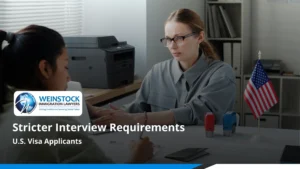PRESIDENT TRUMP SIGNS EXECUTIVE ORDER TEMPORARILY SUSPENDING WORK VISAS
On Monday June 22, 2020, President Trump extended and expanded his April 2020 immigration ban to now include new work visas in addition to family visas. The new order bars hundreds of thousands of foreigners from seeking employment in the United States, as part of a broad effort to limit the entry of immigrants into the country.
In a sweeping order, which will be in place at least until the end of the year, Mr. Trump blocked visas for a wide variety of jobs, including those for computer programmers and other skilled workers who enter the country under the H-1B visa, as well as those for seasonal workers in the hospitality industry, students on work-study summer programs and au pairs who arrive under other auspices.
The order also restricts the ability of American companies with global operations and international companies with U.S. branches to transfer foreign executives and other employees to the United States for months or years long stints. And it blocks the spouses of foreigners who are employed at companies in the United States.
Officials said the ban on worker visas, combined with extending restrictions on the issuance of new green cards, would keep as many as 525,000 foreign workers out of the country for the rest of the year.
The ban only applies to applicants outside the U.S. whose visas are not yet approved. Visa holders and applicants already in the U.S., applicants in other countries who have already received a visa, spouses or children of U.S. citizens, healthcare workers, and some food supply chain workers are exempt from the ban. The restrictions are intended to last until the end of the year, which would disrupt the government’s typical process of awarding new H-1Bs visas at the beginning of the national fiscal calendar in October.
Officials from the Trump administration told The Wall Street Journal that the move is intended to protect American jobs, but executives in the technology industry have long warned that visa restrictions would hurt the nation’s ability to compete in industries that have both strategic and financial significance as engines of economic growth.
Tech officials have even cited immigration curbs as a factor that would force companies to relocate more of their operations overseas to hire and retain top technology talent.
“The technology industry is working overtime to keep Americans connected during a global pandemic by providing food delivery services, telehealth care, collaborative business solutions, and ways for families and friends to stay connected,” said Linda Moore, the president and chief executive of the tech industry’s lobbying group, TechNet, in a statement. “Looking forward, technology will continue to be crucial to the rebuilding of our economy. Today’s executive order only hinders the ability of businesses to make decisions on how best to deploy their existing workforce and hire new employees. This will slow innovation and undermine the work the technology industry is doing to help our country recover from unprecedented events.”
“Putting up a ‘not welcome’ sign for engineers, executives, IT experts… and other workers won’t help our country, it will hold us back,” said Thomas J. Donohue, the chief executive of the U.S. Chamber of Commerce. “Restrictive changes to our nation’s immigration system will push investment and economic activity abroad, slow growth and reduce job creation.”
Estimates provided to The Wall Street Journal indicate that roughly 525,000 people will be unable to enter the country because of the expanded travel restrictions, including 170,000 green card holders barred from entering the U.S. since April. The Trump administration official quoted by the Journal called the initiative an “America-first recovery” that would potentially open 500,000 jobs for out-of-work Americans.
Technology executives are already voicing their displeasure with the reported ban. “Banning all H1B visas means CEOs like me have to open offices and hire more people in countries like Canada that allow immigration. This visa ban is morally wrong and economically stupid,” wrote Anshu Sharma, the chief executive officer of the technology startup Skyflow.
Investors are also up in arms about the decision’s impact on America’s ability to compete.
“Whether his administration realizes it or not, they are creating a significant handicap for US innovation. Our most innovative and impactful portfolio companies and many of their employees started as H-1B holders,” wrote Stonly Baptiste, the co-founder of technology investment fund, Urban.us. “We literally couldn’t have built our portfolio in an environment without H-1B. And we’re not even an immigrant focused fund.”
Also on the chopping block are H-2B visas, which are used to let short-term seasonal workers in landscaping and non-farm jobs into the country, J-1 jobs for short-term workers like camp counselors and au pairs and L-1 visas for corporate company transfers.
“By limiting the talent pool for American companies, the US government is hindering our ability to build strong, defensible organizations,” wrote Andy Coravos, the chief executive officer of the healthcare-focused startup Elektra Labs, in a direct message. “The Trump Administration’s Executive Order to suspend foreign work visas is not only based in fear, but also perpetuates fear within our community, and is not in our society’s best interest.”
Technology executives are not the only ones coming out against the tighter immigration rules. A group of nine Republican senators, including South Carolina’s powerful senior senator, Lindsey Graham, and Texas Senator John Cornyn, issued a joint letter on May 27, which pleaded with the president to reconsider the rumored immigration restrictions.
“Guest workers are needed to boost American business, not take American jobs,” they wrote.
The order will be reviewed in 30 days and then every 60 days thereafter, and contains a section foreshadowing future additions to the ban.
Source: WhiteHouse.gov, WallStreetJournal.com, NewYorkTimes.com, TechCrunch.com, BBC.com
Related posts

New Scrutiny on H‑1B and Skilled Worker Visas: How to Prepare
Summary H-1B visa holders and U.S. sponsoring employers are facing a new era of heightened immigration scrutiny. 2025 introduces stricter rules, higher fees, and increased

Stricter Interview Requirements for U.S. Visa Applicants – What You Must Know
Summary The U.S. visa interview process is set to undergo one of its most significant changes in recent years. Starting September 2, 2025, most nonimmigrant

What the Latest Visa Integrity Fee Means for Non‑Immigrant Applicants
Summary The U.S. government plans to introduce a new Visa Integrity Fee as early as fiscal year 2026. The fee is set at $250 per
